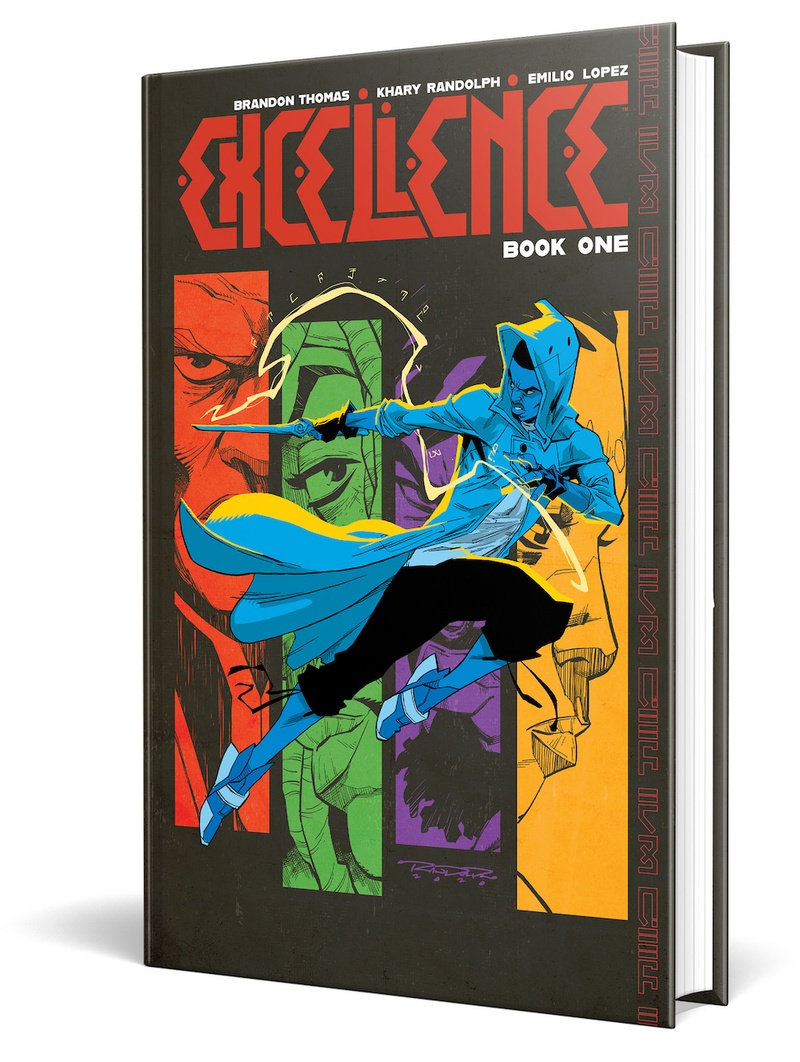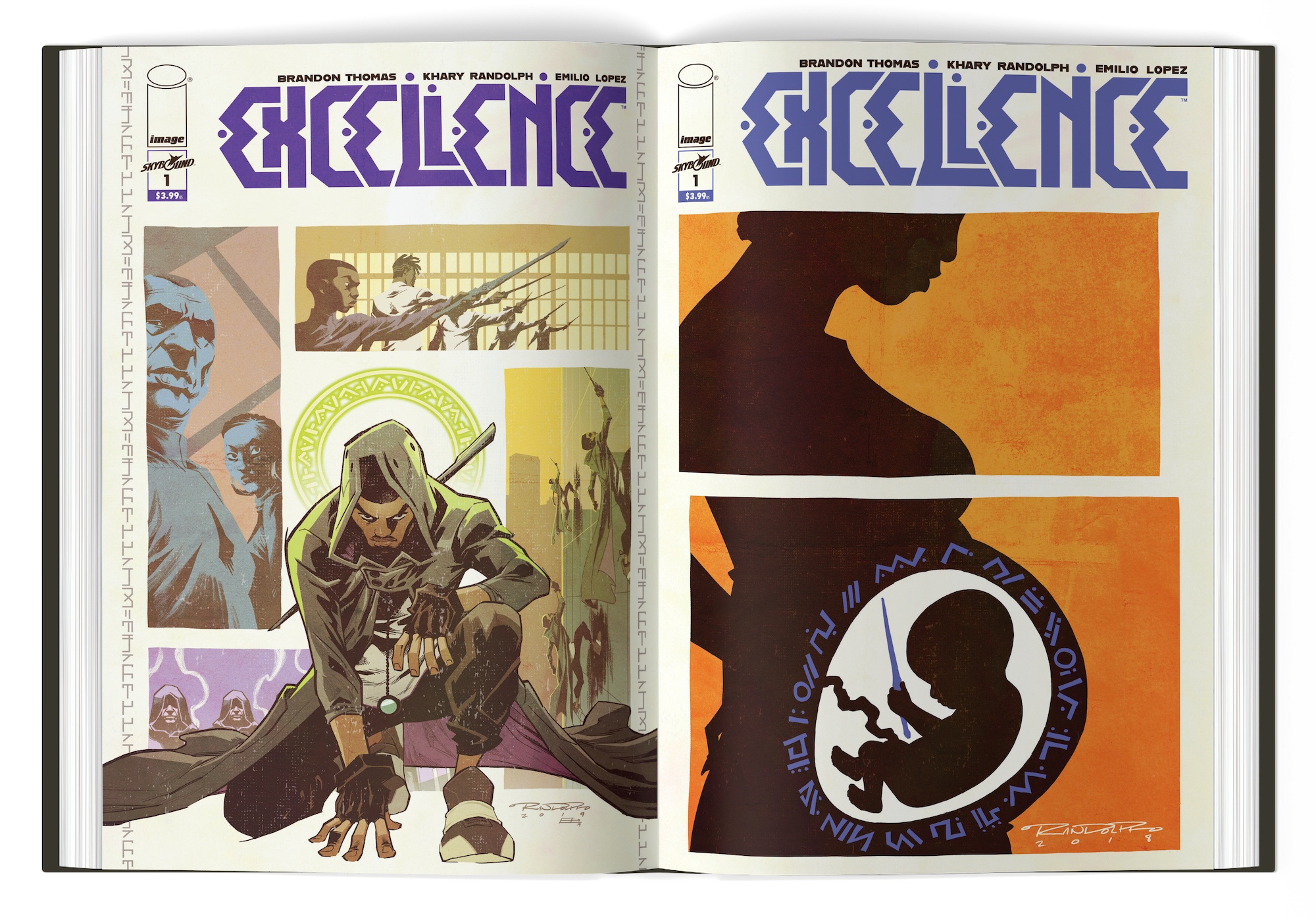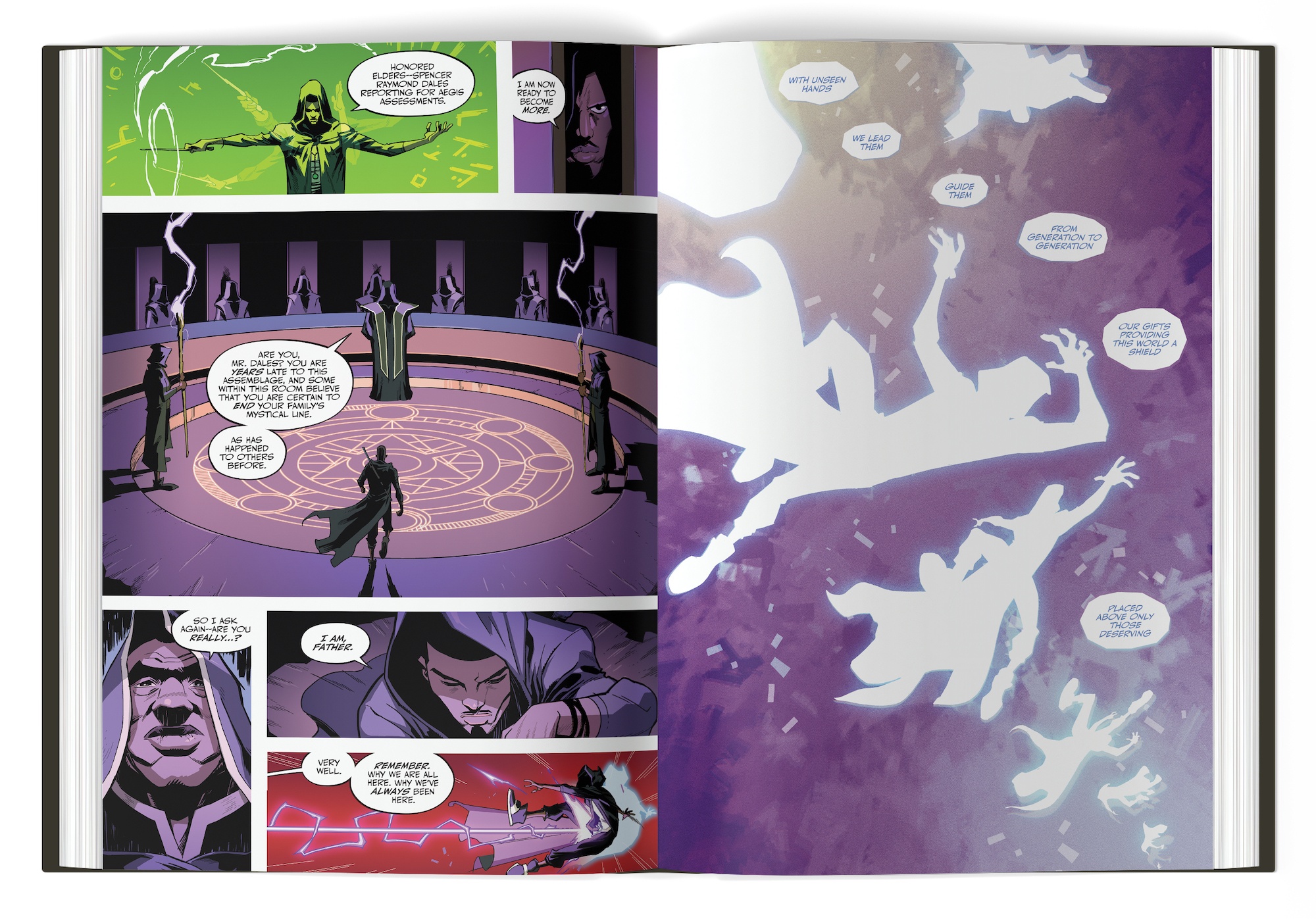On finding the perfect collaborator
Prelude
Brandon Thomas is the writer and co-creator of critically-acclaimed comics series Excellence (Skybound/Image), Horizon (Skybound/Image), and The Many Adventures of Miranda Mercury (Archaia Entertainment). The past year has marked his return to DC Comics, contributing to DC’s Future State event and a number of anthologies, including the newest iteration of Batman: Black and White. Previous work includes the award-winning comics series Noble (Lion Forge), Voltron (Dynamite), and Fantastic Four Tales (Marvel).
Khary Randolph is one of the most celebrated, prolific illustrators in modern comics. The inherent style, dynamism, and power of his razor sharp linework is a perfect amalgamation of his lifelong love of comics, animation, video games, and real hip-hop. His art has appeared on countless comic book covers, been turned into action figures, and inspired the gallery exhibition Black/Excellence in NYC. He reps Brooklyn and Boston of all places (he was born there), which explains a love for Boston-area sports teams, which is the main thing most people find questionable about him. He’s also exceedingly modest, so Brandon wrote this bio on his behalf.
Conversation
On finding the perfect collaborator
Comic book illustrator Khary Randolph and comic book writer Brandon Thomas discuss how they got started, using their work to destroy the idea that all Black people feel the same, establishing daily routines, and creating your own opportunities.
As told to Loré Yessuff, 2194 words.
Tags: Comics, Art, Writing, Collaboration, Beginnings, Identity, Process.
How did you both get into the world of comics?
Brandon Thomas: I got into comics when I was 12 years old. My father was a big comic collector when he was a kid. I don’t know what about me at that point told him that I was ready for comics or that this was the moment, but we went to a comic shop when I was 12 years old called The Fiction House, and it became our monthly ritual for several years.
Every month we would go to the comic shop and I could buy whatever I wanted, no limits. We’d go to the comic shop and leave with a giant, giant stack of books. I was primed to love comics. I decided right around the time I left college that I was going to try to write comics professionally.
All throughout high school, I thought I was going to write adventure novels. And then I went to a comic convention and a seminar was being given by one of my favorite writers at the time. That 50-minute panel changed the course of my life.
It took forever and ever, but I broke in. I started writing an opinion column on a website called Ambidextrous and I would review books and interview other creators that I loved and talk about books that I loved. A couple of big time writers were actually reading my column and they vetted me to editors so I could get my first assignments. That was back in 2003. So technically, I’ve been a published comic book writer since 2003.
Khary Randolph: I’ll do the abridged version. Basically, I started reading around the same time [as Brandon]—12 or 13 years old. Right around the time when Image Comics was first being formed. That whole revolution spoke to me. These young dudes just came in and changed the game and did comics exactly how they wanted to do it. That’s where I fell in love with the medium and became obsessed. Eventually, I just decided I was going to do it full time.
I moved to New York in 1996 to go to The School Of Visual Arts so I could major in making comic book arts, then got an internship at DC Comics in my senior year. I broke into comics around 2003. I’ve been here ever since with a few stopgaps here and there to work in animation and story-boarding and stuff like that. But I’ve been dedicated to doing this stuff for 20 years now.

Obviously, there are so many elements to comics. There’s the writing, there’s the illustration and cartooning. So I’m wondering how both of you decided which mediums that you wanted to pursue?
Brandon Thomas: Well, I used to write and draw my own comics a couple of years after I first discovered them and it quickly became clear to me that I couldn’t draw to save my life. [laughs] At some point it became clear that [drawing] is not a strong thing for me. So I concentrated on the writing.
Khary Randolph: Drawing was always, always, always, always the goal for me. It was the one thing in my life that I was good at. Writing has always been something that I’ve had an interest in, but it’s much harder for me. I can come up with good concepts, but fleshing out a narrative is very difficult for me, which is why I am glad to work with someone like Brandon. I honestly feel like we have a lot of the same instincts when it comes to creating a story. He’s much better at it than me. So I think we compliment each other very well because we come from the same place in a lot of ways. I feel like I have a good grasp on what Brandon is trying to bring out in his writing and he knows the kind of stuff I like to draw as well. Yeah, [we’re] like two sides of the same brain, that’s what it feels like.
I’m really fascinated by this collaboration. How did you guys find each other?
Brandon Thomas: Well, we knew of each other and I was a big Khary fan from afar. And we were both working on other projects at Skybound, which is the company that puts out [our project] Excellence.
So when I started pitching Excellence to them, my editor, Sean Mackiewicz, was like, “What do you think about Khary for this?” And I’m like, “We can’t get Khary. I mean, yes, I love Khary for this. But we can’t get Khary.” And I found, in a couple of instances, when I tell a Skybound editor that we can’t get someone, or I don’t think we can get someone, I feel like they take it personally. It’s like the moment from the Jordan documentary where they’re just like, “Oh, okay, well we’re going to get them just because you said we can’t get them.” I think the first time we talked about [working together] was at one of the Skybound parties…or maybe we talked on the phone first?
Khary Randolph: Here’s how it happened, alright. Here’s the thing about comics. Comics is a very small industry and the number of Black people in comics is a small, inside of a small industry. So everyone in comics, who’s Black already knows each other.
So me and Brandon already knew each other and we had run into each other at a couple of different Skybound events. And then our editor, Sean Mackiewicz, hit me up and was like, “Yo, Brandon’s got this thing about Black magicians.” And I’m keeping a hundred percent honest. At first, I was like, I don’t know. And it had nothing to do with Brandon. It was the fact that I had been on a run of books that all had strong Black male protagonists. And I didn’t want to get pigeonholed into a thing where people think I can only draw young Black men. So I was a little worried about that, but then Sean was like, “Just talk to Brandon. Just talk to Brandon.” Which was incredibly wise on Sean’s part because anyone that talks to Brandon for five minutes, you can’t help but be blown away by his enthusiasm. And on top of that, it was really Brandon highlighting the relationship between the main character Spencer and his father. That was what really spoke to me. Because it was less about them being Black. And it was more about just a father and son relationship that spoke to me on a really personal level. And once he gave me that pitch, I was like, “Oh yeah, this is something that I think I could do very well.” And I pretty much agreed on the spot.

You mentioned that you don’t think Excellence’s narrative could have come out a few years ago. I’m wondering if that’s because the comic book industry has changed or because just the state of racial matters in this country, or is it a little bit of both?
Brandon Thomas: I would say it’s probably a little bit of both. The landscape of pop culture and mass media has changed. We didn’t know it, but we had Black Panther coming, we had Into the Spider-Verse coming. So there were all of these examples of this is what this is, and this is what this could be.
And people, they need to see things before they believe it sometimes. And for better or worse, we are in an environment right now where people have started to believe it. Now, whether or not that belief is going to carry with us forever or far into the future, I don’t know. But right now we are in a landscape where a book like this can actually be talked about and discussed as more than just a Black project. Or some vanity book that, you know how other, I’m not speaking specifically to this, but there are other companies that do these types of things, just so they can pat themselves on the back. And say, “Oh hey, look guys, we had six issues of some random Black character that hasn’t been around for years. And aren’t we great. And aren’t we moving forward. Excellence is really, it’s ours. It’s a product of us and it could not exist without us. And there is no other book in comics right now that has the things that Excellence has.
Even if they have quote unquote diverse creative teams, those teams don’t own the characters. They haven’t created the characters. Their emotions and aspirations and hopes and dreams and fears are not ingrained in these characters like they are in this book. And it feels like a really special experience to make this book with Khary and with Emilio Lopez who does the colors and our letterer Deron Bennett and every single one of us brings something a little personal to the story.
And it turns into this really great amalgamation of all four of us and all of us have different, what we consider authentic is all slightly different, but that’s great. That’s what we need. That’s another thing about Excellence that we want to basically destroy the monolith, the idea that all Black people or all Black men feel the same way about this. So it’s very important for us to show the shades and complexities of Blackness and perspective and try to make all of those perspectives seem valuable and understandable and reasonable, even when they’re in conflict with each other.
Khary Randolph: Yeah. I can’t add anything to that. That’s why he’s the writer. [laughs]
What are some of the most valuable resources for the work that you do?
Khary Randolph: It’s the internet, man. Any information you want to find, you can get it with Google. Just get a platform. Go on Twitter, go on Instagram, find what you’re good at, then create it. And eventually, I think, a fan base will come to you.

What advice would you give to people who are interested in entering the comic book world, or, getting into writing, getting into illustration.
Khary Randolph: If anyone wants to get into the comic book industry. It’s pretty simple in terms of, you just have to create something now. Don’t wait for someone to hire you to create work, just do it yourself. With the internet being what it is right now, it’s so easy to just create stuff and put it out so people can find your work. You don’t need giant companies to make this happen.
Not that it’s easy. Nothing’s easy. It’s quite difficult, but it’s easier now to create content and publish it than it has ever been in the entirety of human civilization. So just do it, just do it.
Brandon Thomas: For the writers out there. You have to make writing a part of your life. That was really important for me, making it a part of my daily routine. When I was starting out, I would give myself a schedule or a page count where every day I want to write for, let’s say, a half an hour, it doesn’t even have to be that. The thing that was very important for me was setting realistic goals for myself. As you accomplish goals, you basically are emboldened. Like if you make a promise to yourself that you’re going to write for even 15 minutes and you do it for an entire week it feels great. And then if you do it for an entire month, it feels better.
Make it a part of your life and your daily routine. Don’t sit and wait. You can’t always wait for the feeling. We all want to wait for the perfect opportunity and the perfect conditions. And if you’re living life, you’re never going to have that perfect window. So you basically have to create your own windows. You have to carve time. You have to put it into your life and make it something that’s like a muscle. Whether you want to write books, screenplays, comics, you have to do whatever you can to keep your hand moving.
Khary Randolph Recommends:
Future State Aquaman by Brandon Thomas & Daniel Sampere
Brandon Thomas Recommends
May The Lord Watch - Little Brother
The Invisibles (comic) - Grant Morrison, Steve Yeowell, Jill Thompson, Phil Jimenez, Chris Weston,& others
- Name
- Khary Randolph & Brandon Thomas
- Vocation
- Illustrator and writer
Some Things
Pagination



